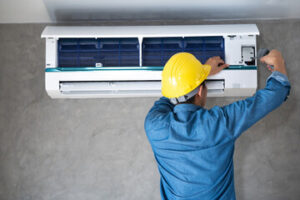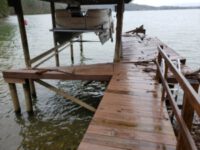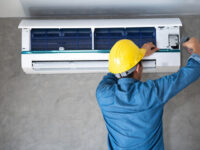How AC Repair Costs Can Affect Your Electricity Bills
Several factors influence the total AC Repair Sherman Oaks cost. The first is the basic service call fee. Then there’s the cost of parts and labor.
Excessively high energy bills could signal an AC problem. Dirty filters restrict airflow and increase the cycle duration, causing higher bills. Duct leaks can also raise energy costs.
If your home is well insulated, the AC unit is working properly, and the ducts are clean, you should be able to expect your energy bills to remain relatively low. However, if you notice that your electricity bill has suddenly skyrocketed, it could be a sign of an AC issue that needs to be addressed immediately.
Failing parts like motors and capacitors will cause your HVAC system to work harder than necessary to cool your home. This will increase kilowatt usage and lead to higher electric bills. A professional AC technician can help identify the problem and repair it before your electric bill gets out of control.
Leaking refrigerant is another common cause of high electricity bills. If your AC system is leaking refrigerant, it will have to run more frequently to keep up with cooling demands. This will drive up your energy bills and reduce overall efficiency. The good news is that a trained AC technician can easily identify and repair any leaks.
Other AC issues that can contribute to high energy bills include an overheated compressor and a dirty air filter. These problems can also make your home more humid than usual, which leads to a sticky feeling and an uncomfortable indoor environment. Humidity can also affect indoor allergies and asthma.
The best way to prevent high electricity bills is to schedule regular maintenance for your HVAC equipment. A professional technician will inspect your system for any minor problems and fix them before they turn into major headaches.
The cost of AC maintenance is much lower than the cost of emergency repairs or replacement parts. In addition to reducing your utility bills, the service will also extend the lifespan of your equipment. Investing in preventative maintenance is well worth the money.
Faulty Thermostat
Most of the time, the thermostat is one of the first things you can point to when your air conditioner or heating system breaks down. Some thermostat issues can be easily fixed with simple troubleshooting, while others may require professional AC repair.
The thermostat is responsible for sending signals to the HVAC system to turn the cooling and heating functions on and off. If your thermostat is broken, it won’t be able to do this correctly, and you’ll end up with problems with your system.
If your thermostat seems to have stopped working completely, the first thing you should do is check the batteries. Then, you should replace them if necessary. If the problem persists, it might be a good idea to take a look at the thermostat’s user manual. Sometimes, there are specific instructions for testing or resetting the thermostat that can help you find the cause of the issue.
Another common thermostat problem is when it fails to display the correct temperature in your home. This could be because the temperature sensor isn’t functioning properly or because the unit has become disconnected from the sensor wires. In either case, a thermostat that doesn’t display the right temperature will need to be replaced.
Lastly, you should check the thermostat’s electrical connections to make sure they are secure. This is a job that requires electrical knowledge and familiarity with different air conditioning systems, so it’s best left to a qualified professional. Attempting to fix a faulty thermostat without the proper expertise can lead to additional costly repairs down the line, not to mention the potential dangers of working around electrical components.
Thermostats are also prone to becoming dirty over time, especially if the cover isn’t cleaned regularly. Dust and dirt can cause electrical and mechanical problems for the thermostat, so it’s important to keep the unit clean. To do this, shut off the power to the unit and remove the cover. Then, use compressed air or a brush to remove any dirt or debris from the unit’s insides. Once you’re finished, replace the cover and flip the power back on.
Faulty Compressor
The compressor is the heart of your air conditioning system. It is responsible for compressing refrigerant gas and sending it through your cooling system to remove heat and excess humidity from your Pace, Florida, home. If something goes wrong with your compressor, it can cause problems throughout the entire system. The good news is that your AC repair company can replace a bad compressor and ensure that the problem doesn’t spread to other parts of the system.
If you’re hearing clanking or banging sounds from your air conditioner, it could be a sign that the compressor is going out. The sounds may be coming from the compressor itself or from other components in the system, such as the evaporator and expansion valve. You can try to troubleshoot the issue by finding the breaker for your compressor in your service panel and turning it off and back on again. This can sometimes reset the system and make it run properly again.
Other noises that you may hear from your air conditioning compressor include high-pitched squealing and the sound of metal grinding against itself. This can occur if the compressor’s sealed bearing starts to wear out or seize up. In some cases, replacing the compressor will be more cost-effective than repairing it.
Another common sign that the compressor is going out is if your system is not producing cold air as often. A faulty compressor will have trouble compressing the refrigerant to circulate through the system, and this can lead to low airflow from your vents.
Finally, you might notice that your air conditioning system takes longer to start than usual. This could be due to a number of things, including a lack of oil in the compressor or a defective starter capacitor that stores high voltages. If you have ruled out these issues and the compressor still fails to start, then it’s likely that there is a problem with it internally that you will need to have checked by a professional. Investing in preventative maintenance is the best way to avoid these problems, and your AC repair technician will be able to detect any signs that the compressor may be going out early.
Faulty Fan
When the air conditioner is running but doesn’t produce cold air, a couple of things could be wrong. First, check that the thermostat batteries are fresh and that the unit is set to cool. Also, make sure all vents and ducts are open. If those aren’t the problem, a dirty air filter or evaporator coil might be blocking air flow. This can lead to the evaporator coil freezing up, which in turn prevents the fan from turning on.
If your AC runs but isn’t cooling, you should hear a whirring sound from the indoor fan and a deep buzzing sound from the compressor. Listen to these sounds at different speeds, and you should be able to tell which is which. If the fan isn’t running, you might need a new motor or a capacitor, which are relatively inexpensive to replace. The other possible issue is a bad contractor, which supplies voltage to both the compressor and fan. If this part burns out or gets pitted, it will stop the flow of electricity and prevent the system from starting at all.
A frozen evaporator coil is another reason to call for AC repair. This happens when the airflow is blocked by a clogged air filter or because there’s too much refrigerant in the lines. In this case, you’ll need to get a professional in to fix the problem and refill your system.
If you notice any of these issues, it’s time to get your air conditioner repaired by a qualified professional. A quick maintenance visit can catch many problems before they become serious and save you money on energy bills. If you have any questions about the condition of your AC unit, contact a Natrad technician near you for advice. To find a service center, enter your zip code below, and you’ll be matched with top pros near you.






